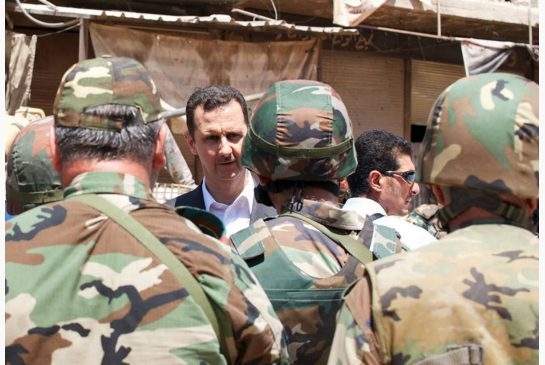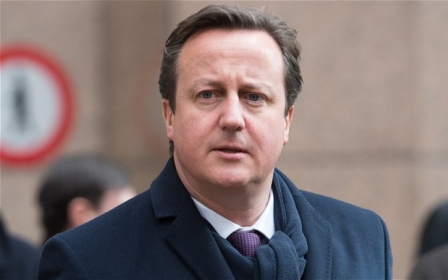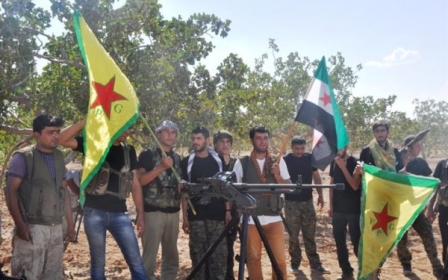Syria opposition bristle at idea of Assad alliance

France’s foreign minister on Friday mooted the idea that forces from the Syrian army - currently ostensibly loyal to Syrian President Bashar al-Assad - could, or should, join up with forces from the Syrian opposition in order to combat their mutual enemy, the Islamic State (IS) group.
Laurent Fabius told RTL radio that in order to fight IS "there must be two measures: bombings... and ground troops who cannot be ours, but who should be of the (opposition) Free Syrian Army, Sunni Arab forces, and why not regime forces too.”
He later backtracked, adding that such an alliance should take place in the context of a “political transition” with Assad stepping down from power.
But the idea is still likely to prove highly controversial to members of the Syrian opposition who see their battle as primarily against Assad rather than IS.
Essam al-Rayyes, spokesperson for the purportedly non-Islamist Southern Front of the Free Syrian Army, one of the most powerful groups fighting in Syria, said that the suggestion was “delusional.”
“Anyone who thinks that we can co-operate with Assad’s forces has to remember that Syrians have never stood behind Assad,” he told Middle East Eye. "This is why he had to bring in the Iranians and the Hezbollah militias, and now the Russian aggressors. Despite all the air and ground support he is getting he hasn’t been able to achieve any significant advances on the ground.
“The message from this is clear: pinning your hopes on Assad’s forces has become a delusional idea,” al-Rayyes said.
French officials have always maintained that Assad was part of the problem in Syria and that any solution must involve his leaving office.
Speaking on Thursday with Russian President Vladimir Putin - who despite differences has been increasingly seen as an ally against IS - French President Francois Hollande reaffirmed that, “Assad can play no role in Syria’s future”.
He said he was, however, willing to work with Putin “hand in hand” to defeat IS despite the Russian president’s support for Assad.
Other activists have said that they are willing to draw a line between Assad and the military, despite a previous consensus that the Syrian military was heavily under the thumb of the Commander-in-Chief.
“Yes, it would be possible for the FSA to join up with the remnants of the Syrian army [after Assad goes]” said Abu Maher, an aid worker in Deraa, a stronghold of the Southern Front. “Most of those will be people who were tasked with administrative work in the regime’s army. The US, Europe and Russia will be keen to partner with them to fight what they call extremist terror.
“However, this can only come about if they increase their material support for the moderate factions of the FSA, and after Assad and his cronies go.”
Though dissent in the Syrian army is hardly publicly expressed, there have been many signs that discontent is growing over the increasingly influence of Iranian military commanders and foreign militias.
One former military officer told MEE that within Division 9, one of the largest Syrian army divisions in the south of the country, most of the 4000 troops were now non-Syrians.
“Without the Iranian Revolutionary Guard Corps (IRGC) and Lebanese Hezbollah the army could not stand up. Seventy percent of the troops in Division 9 are Iranian troops or Lebanese Hezbollah, the rest are shabiha (paramilitary). Only two to three percent are regular Syrian soldiers,” said Khaled al-Shami.
“The Iranians and Hezbollah are not under the control of the Syrian Army, the exact opposite.”
Al-Rayyes said that the lack of an authentic and organised Syrian army meant that the question of building an alliance against IS was essentially irrelevent.
“On the ground at the moment we aren’t seeing anything that could be described as a regime army,” he said. “All we’re seeing is Iranian and Iraqi militias, as well as Hezbollah fighters and Afghan mercenaries.
“The only people fighting IS at the moment are the FSA and some other factions,” he added, citing the criticism often levelled at the Syrian army that they have been reluctant to fight IS.
Increasingly, with IS now engaging in attacks in Europe, Western leaders have begun to raise the possibility that differences need to be set aside with Assad in order to combat the IS threat.
Spanish foreign minister made that trajectory clear last week when he said that Assad was the "lesser evil" and that there was a need for unity against the "common enemy".
"We have to replace the 'Bashar yes or Bashar no' discourse by one of peace or war," he told TVE television.
"If you want peace, you are going to have get along with Assad at least on a temporary basis."
But for those activists and fighters who began their struggle under the barrage of Assad's forces, prioritising IS as the greater evil is going to be a challenge.
"Any country, France or others, must understand that Assad and his mercenaries are the number one sponsors of terrorism," said opposition activist Muaawiya al-Zaabi.
"Co-operating with him in counter-terror operations will only make the situation more messy. Any co-operation would have a negative impact on what is left of the Syrian people, who have suffered under Assad’s oppression."
Middle East Eye propose une couverture et une analyse indépendantes et incomparables du Moyen-Orient, de l’Afrique du Nord et d’autres régions du monde. Pour en savoir plus sur la reprise de ce contenu et les frais qui s’appliquent, veuillez remplir ce formulaire [en anglais]. Pour en savoir plus sur MEE, cliquez ici [en anglais].




